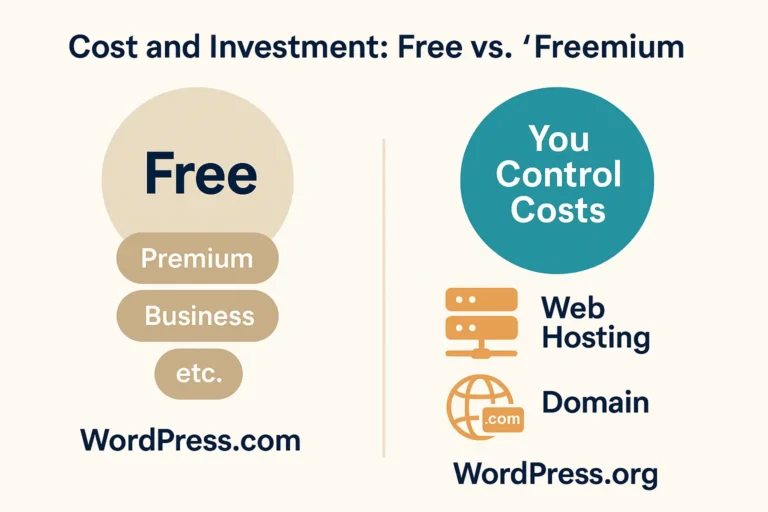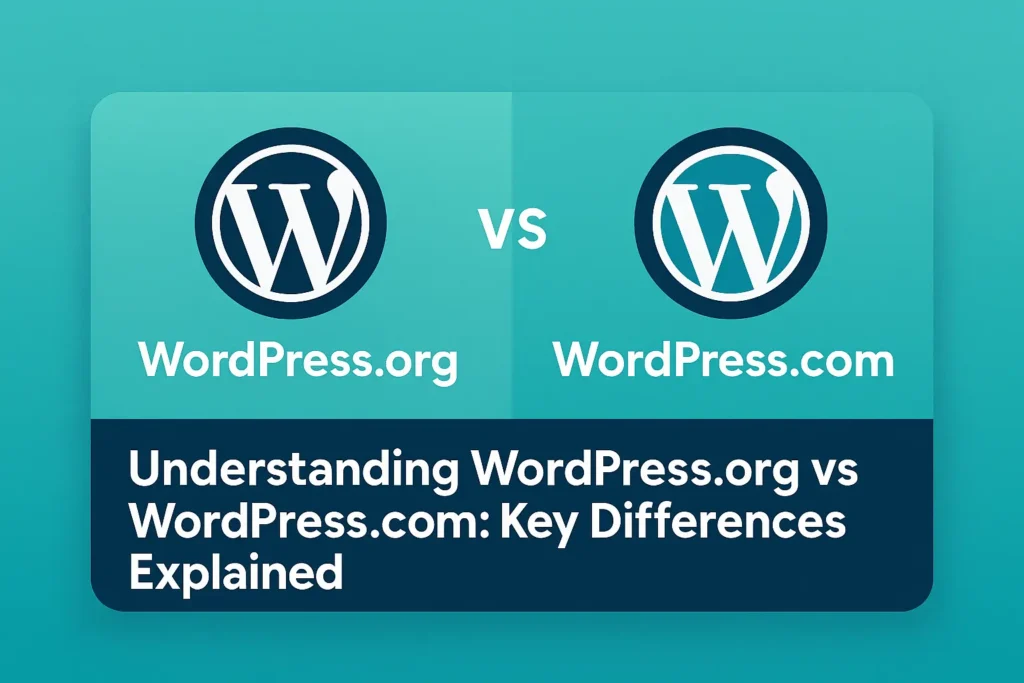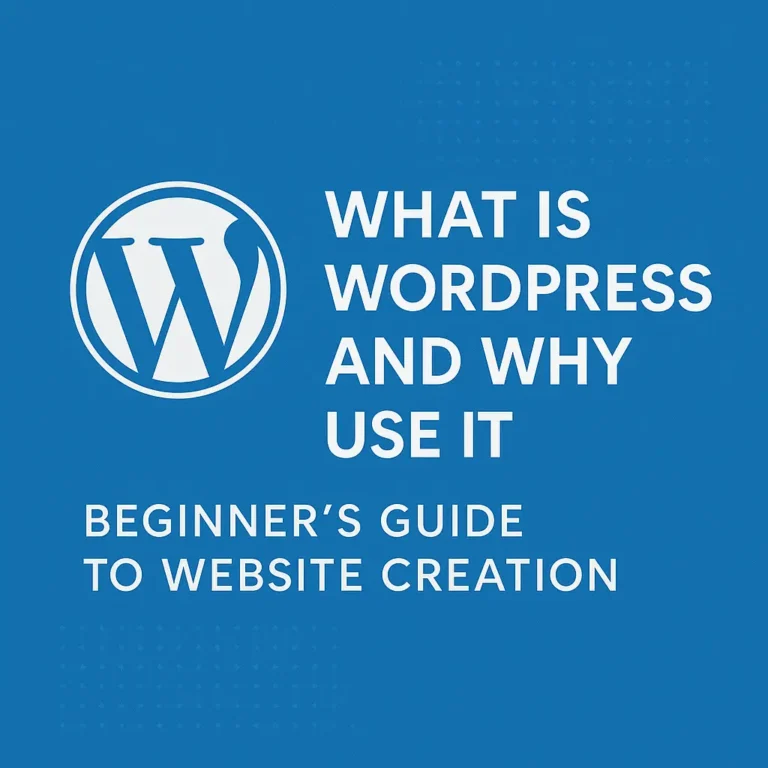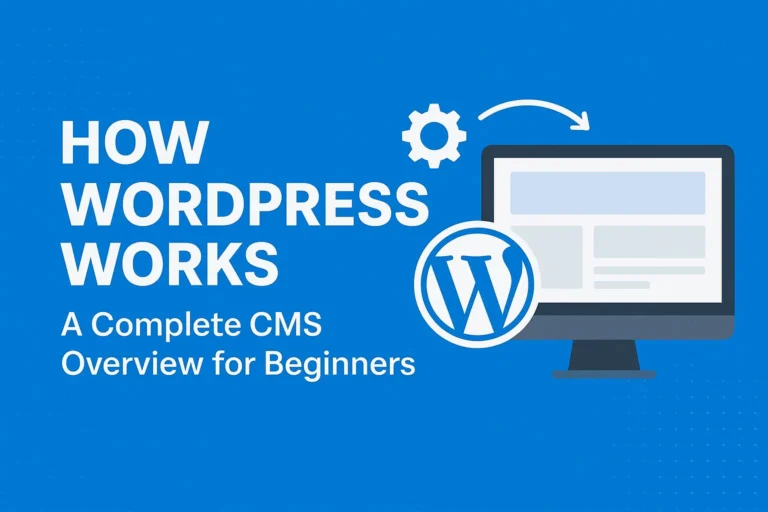If you’ve decided to build a website with WordPress, congratulations! You’ve chosen a fantastic platform. But now you’ve hit your first crossroads: WordPress.org vs WordPress.com.
If your eyes just glazed over, don’t worry. You’re not alone. The naming convention is, frankly, confusing. Many beginners think they’re the same thing, but choosing the wrong one can seriously limit your website’s potential.
So, let’s clear this up once and for all. Think of it as the difference between renting an apartment and owning a house. Both give you a place to live, but the level of freedom, responsibility, and cost is dramatically different.
By the end of this article, you’ll know exactly which one is the right fit for your goals.
The Core Difference in a Nutshell
WordPress.com: A hosted service. It’s an all-in-one platform where the company (Automattic) handles the technical stuff for you. You “rent” space from them.
WordPress.org: The self-hosted, open-source software. You download the free software, but you need your own web hosting and domain name. You “own” your property.
Now, let’s break down what that actually means for you.
1. Cost and Investment: Free vs. “Freemium”

WordPress.com: Offers a free plan, which is great for dipping your toes in. However, it’s very limited. Your website will have a subdomain (like
yourname.wordpress.com), and you’ll have WordPress.com ads displayed on it. To get a custom domain, remove ads, or access more features, you must upgrade to a paid plan (Personal, Premium, Business, etc.), which is a recurring subscription.WordPress.org: The software itself is 100% free. However, you are responsible for the costs of running a website:
Web Hosting: You pay a hosting company (like SiteGround, Bluehost, or WP Engine) for server space. This is typically $3-$15/month.
Domain Name: Your custom web address (www.yoursite.com) costs around $10-$15/year.
Conclusion: While WordPress.org has upfront costs, it often provides far better value and power for your money in the long run compared to the higher-tier WordPress.com plans.
2. Customization and Control: The “Ownership” Factor
This is the single biggest differentiator.
WordPress.com: Your customization options are locked to your plan. On the free and personal plans, you can only use the themes and plugins that WordPress.com allows. You cannot upload custom themes or most third-party plugins. You’re living by their rules.
WordPress.org: You have complete and total control. You can install any theme from any source. You can add any of the 59,000+ free plugins or thousands of premium plugins to add features like online stores, membership areas, and complex forms. You can edit the code itself if you want to. You truly own your digital property.
3. Maintenance and Responsibility: Hand-Holding vs. DIY
WordPress.com: They handle it all. Security, speed, backups, and software updates are managed for you. It’s largely maintenance-free, which is a major plus for those who want a hands-off experience.
WordPress.org: You are responsible for everything. You must manage your own updates, security, and backups. This sounds scary, but in practice, your hosting company often provides tools to help, and plugins can automate almost all of it (e.g., UpdraftPlus for backups, Wordfence for security).
4. Monetization: How You Can Make Money
WordPress.com: On the free plan, you cannot run your own ads. If you display ads, WordPress.com keeps the revenue. You can only start monetizing with your own ads on the Premium plan or higher. Affiliate links are generally allowed.
WordPress.org: You can make money in any way you see fit. Run Google AdSense, sell direct ad space, create an e-commerce store with WooCommerce, or set up a membership site. You keep 100% of the revenue.
The Quick-Reference Summary Table
(Image Suggestion: Place a clean, easy-to-read table here summarizing the key points side-by-side.)
| Feature | WordPress.com | WordPress.org |
|---|---|---|
| Cost | Free (with limits) or Paid Plans | Free Software, but you pay for Hosting & Domain |
| Domain | Subdomain on free plan | Your own custom domain (www.yoursite.com) |
| Themes | Limited selection based on plan | Any theme you want |
| Plugins | Not allowed on most plans | Any plugin you want (over 59,000) |
| Custom Code | No | Yes, full access |
| Maintenance | Handled for you | You are responsible |
| Monetization | Restricted by plan | Complete freedom, you keep all revenue |
| Best For | Hobby bloggers, personal sites | Businesses, professionals, anyone serious about growth |
So, Which One Should YOU Choose?
Making the choice is simpler than you think.
Choose WordPress.com if:
You want a simple blog or personal website and don’t plan to monetize it.
The idea of any technical maintenance (updates, backups) makes you nervous.
You’re on a tight budget and the free plan meets your minimal needs.
Choose WordPress.org if:
You are building a website for a business, professional brand, or online portfolio.
You want full control over the design, functionality, and monetization of your site.
You have (or are willing to learn) a little bit of a DIY spirit to manage your site.
The Final Word
For most people with serious goals for their website—whether it’s to grow a business, build a brand, or have true creative freedom—WordPress.org is the unequivocal winner. The initial learning curve is a small price to pay for the limitless potential and ownership you gain.
Think of it this way: WordPress.com is a convenient scooter for a quick trip, but WordPress.org is the keys to your own workshop, where you can build anything you can imagine.





